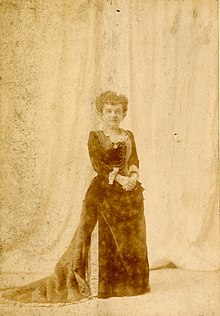Queenie Foote
Queenie Foote | |
|---|---|
 Queenie Foote, from an 1890 photograph. | |
| Born | Eliza S. Nestel 1857 Fort Wayne, Indiana, US |
| Died | 25 April 1937 Fort Wayne, Indiana, US |
| Occupation | Performer |
Queenie Foote (1857 – April 25, 1937), born Eliza S. Nestel, was an American performer, sometimes also billed as The Fairy Queen.
Early life[edit]
Eliza S. Nestel was from Fort Wayne, Indiana,[1][2] the daughter of blacksmith Daniel Nestel and Henrietta Goebel Nestel. She was a dwarf. Her parents immigrated to the United States from the Kingdom of Prussia; they were both quite tall. She began making public appearances as a child[3] with her older brother Charles, who was also a dwarf,[4] under the management of William Ellinger,[5][6] and with their father as chaperone.[7]
Career[edit]
Foote and her brother Charles W. Nestel, known as "Commodore Foote",[8] toured in the United States, Canada, Mexico, and Europe.[9] They met with Abraham Lincoln at the White House in February 1864.[10] While in Washington, she was the object of an anatomical study, along with her brother and others.[11]
They met Queen Victoria.[7][12] They were seen with the Lilliputian Comic Opera Company,[13] working with other performers, including fellow little people Commodore Nutt, Admiral Dot, and Jennie Quigley.[14] Charles rejected the "sideshow" label, saying "My sister and I played only the best of concert and dramatic stages, and neither of us every played in any circus or sideshow," adding "We were actors, not freaks."[7] In 1895 she helped another brother sell jewelry in Ohio.[15] She was injured in 1909;[16] by 1912 they had retired to Fort Wayne.[7]
Personal life[edit]
Nestel died in 1937, aged 80 years, a few days after her brother died.[17][18][19]
References[edit]
- ^ "Two Small Ones". Placer Herald. June 28, 1890. p. 6. Retrieved September 2, 2020 – via California Digital Newspaper Collection.
- ^ "Eliza Nestel, of Touring Midgets, Dies of Old Age". The Oshkosh Northwestern. 1937-04-26. p. 5. Retrieved 2020-09-02 – via Newspapers.com.
- ^ "Queenie Foote; The Smallest Living Lady Interviewed by a Register Reporter". The Sandusky Register. 1895-04-30. p. 5. Retrieved 2020-09-02 – via Newspapers.com.
- ^ History of Charles W. Nestel, Known as "Commodore Foote," the Smallest Man in the World, and His Sister, Miss Eliza S. Nestel, Known as the "Fairy Queen" of the West, the Smallest Lady in the World!: To which is Added Some of Their Songs, Poetry, and an Account of Their Parents and Relations. Gazette Steam Book and Job Printing House. 1872.
- ^ Thompson, Brian Christopher (2015-05-01). Anthems and Minstrel Shows: The Life and Times of Calixa Lavallée, 1842-1891. McGill-Queen's Press - MQUP. ISBN 978-0-7735-8416-7.
- ^ "To Forsake Garden for Stage". Fort Wayne Daily News. 1909-07-17. p. 6. Retrieved 2020-09-02 – via Newspapers.com.
- ^ a b c d Dildine, Frank (1912-09-21). "Two 'Little People' of Fort Wayne Famed in Amusement Circles for a Third of a Century". The Fort Wayne Sentinel. p. 12. Retrieved 2020-09-02 – via Newspapers.com.
- ^ Humphrey, Marmaduke (March 1896). "The Pranks of Nature". Godey's Magazine. 132: 298, 302.
- ^ "Midgets at the City Hall". The Baltimore Sun. 1904-09-23. p. 12. Retrieved 2020-09-02 – via Newspapers.com.
- ^ Commission, United States Lincoln Sesquincentennial (1960). Lincoln Day by Day. pp. 240–241.
- ^ Sanitary memoirs of the war of the rebellion v. 2, 1869. U.S. Sanitary Commission. 1869. pp. 312–315. ISBN 9781432820848.
- ^ "Midget Queenie Dies, Eight Days after Brother". Chicago Tribune. 1937-04-26. p. 22. Retrieved 2020-09-02 – via Newspapers.com.
- ^ "Dramatic and Lyric". The Salt Lake Herald. 1892-01-24. p. 3. Retrieved 2020-09-02 – via Newspapers.com.
- ^ "'Royal Midgets' at the Star". The Buffalo Commercial. 1891-09-25. p. 6. Retrieved 2020-09-02 – via Newspapers.com.
- ^ "Here's a Novelty". The Sandusky Register. 1895-05-02. p. 5. Retrieved 2020-09-02 – via Newspapers.com.
- ^ "Queenie Foote, Sister of Commodore Foote, Injured". Billboard. Vol. 21. February 27, 1909. p. 15 – via ProQuest.
- ^ Hartzman, Marc (2006). American Sideshow: An Encyclopedia of History's Most Wondrous and Curiously Strange Performers. Penguin. pp. 75–76. ISBN 978-1-58542-530-3.
- ^ "Midget 'Queenie' Placed in Vault". The Edinburg Daily Courier. 1937-04-28. p. 1. Retrieved 2020-09-02 – via Newspapers.com.
- ^ "Lilliputian Star is Buried". Nevada State Journal. 1937-04-28. p. 1. Retrieved 2020-09-02 – via Newspapers.com.
External links[edit]
- Queenie Foote at Find a Grave
- Charles Nestel ("Commodore Foote"), Eliza Nestel ("Queenie" or "Fairy Queen"), and Joseph Huntler ("Colonel Small"), full-length studio portrait, in the collection of the Library of Congress.
